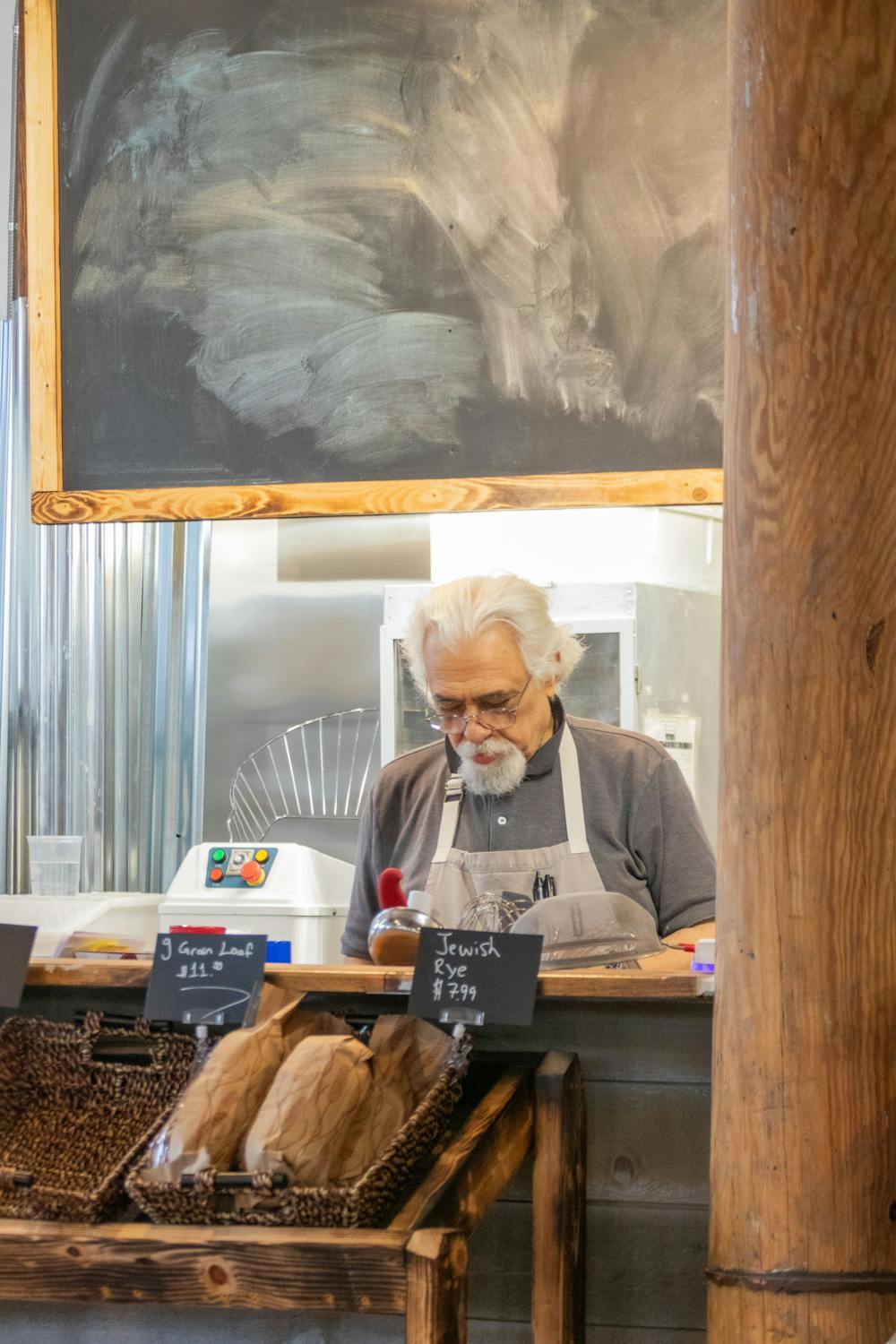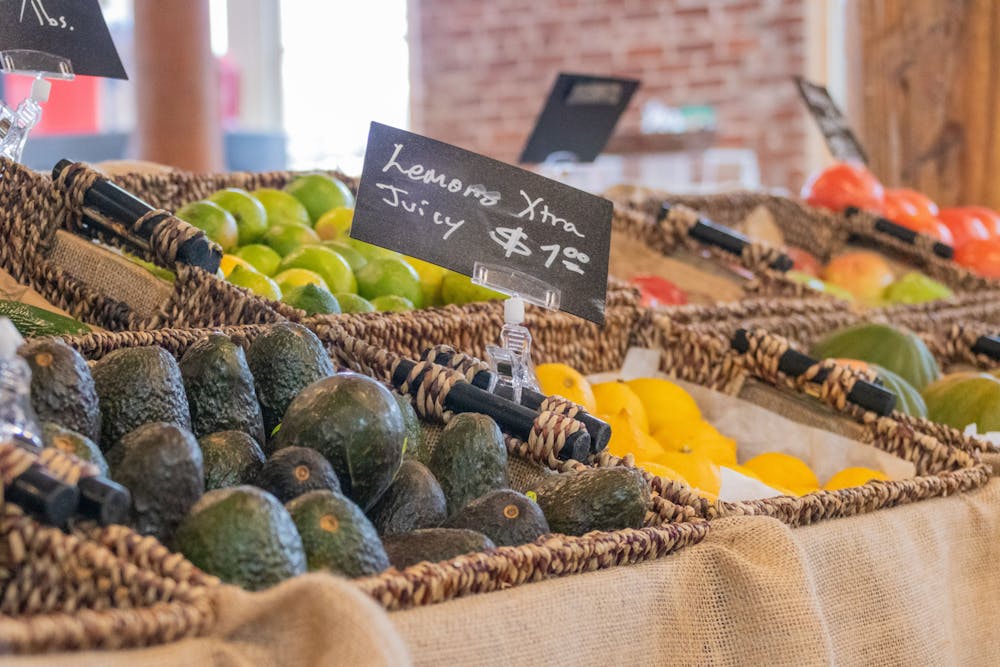Located on the corner of Lady Street and Lincoln Street, Farmers Market Xchange by Toms Creek Farms draws you in before the owners can even finish putting up the "Coffee and Produce" sign. The warm greetings that you can only otherwise receive at a local cafe in a quaint European city, the smell of freshly baked sourdough loaves and focaccia pizzas and the rows of locally sourced and unique honey, teas, spices and jams keep you coming back for more.

Toms Creek Family Farms is located on 176 acres of rolling land, just outside the Columbia cityscape in Hopkins. The farm grows fresh greens, vegetables, fruits, poultry, olive trees and more.
If you are searching for the man running the show, look no further than Dr. Neşet Hikmet, in his blue baker's apron, holding a tray of scones and a ready smile.
In September, Hikmet opened Farmer's Market Xchange with his wife and sons, with the intent of selling produce and meat from Toms Creek. This then expanded to sourcing fresh goods from other local Midlands farms. "We have the cafe, the bakery, custom meat, deli, produce and grocery items,” Hikmet said.
Hikmet shared that his motivations for founding the market come from keeping food locally sourced. “If you open a market, you bypass the supply chain issues. After COVID, we had the opportunity to buy this place," he said.
Most people buy their food from the grocery store or supermarket without thinking twice about where it’s coming from. Hikmet expressed concern on this matter. “They should worry," he said. "We know that by the time supermarkets can get produce into their store, it takes about 10 to 12 days, so the freshness is gone.”
The market, on the other hand, does not keep a surplus of goods for a long period. “In our case, it’s two days at most," Hikmet said. "And we only keep it out for two days once it's in the store. If we don’t sell it, it goes back to the farm to compost or to feed the animals. So nothing goes to waste.”
The Farmers Market also bakes all of their goods with quality ingredients only. “The source of your bread is critical,” Hikmet pointed out. He mentioned that they only use whole grain, stone ground, organic wheat and ancient grains like kamut and spelt.
“No preservatives or other additives,” he emphasized. “It is easy to say what is in my bread, but if you grab bread in the store, you cannot even pronounce the ingredients.”
He pointed out that, "Cheapness, or expensiveness for that matter, is not necessarily a sign of quality or a reason to buy something."
Hikmet said that the idea for the Xchange “wasn’t a store, but a community-like place". He addresses new faces in the store as "my dear friend," explaining that they are “not new people, but new friends!”

“I wouldn’t call them customers,” he added. “We remember faces like a local bar would. Remember the bar in the series 'Cheers?' Where everybody knows your name.”
Hikmet explains that being creative and supporting the community were his foremost priorities. “How can we be a sustainable source for Columbia, and how can we have a positive impact on the community?” he commented. One of the ways Hikmet strives to do this is by helping to alleviate food insecurity. In mid-February, the farm provided produce and other goods, via a mobile farmers market, to certain neighborhoods considered to be “food deserts.”
Hikmet’s academic work also focuses on healthy living and providing healthy options to underserved areas. He works with the Arnold School of Public Health, the College of Physical Education, the College of Education and the College of Medicine, as a part of his research.
“How can we make a change? By awareness,” Hikmet said. “This allows us to be able to control the food source and also to be able to measure the outcomes of healthy eating. We want to keep track of what [residents] are buying, for example, when we bring the farmers markets to the food deserts, and how that impacts their health and wellbeing down the line. We see an opportunity to make an impact.”
Hikmet’s work and Mediterranean way of life go hand-in-hand with his aspirations of bringing quality goods to Columbia. Hikmet was born in Cyprus, but he attended middle school, high school and college in Turkey. Hikmet’s father and paternal grandfather were grocery shop owners, and his grandfather was also a merchant. His maternal grandfather had a citrus farm with orange groves, grapefruits, lemons and so on.
Hikmet explains that growing up in his small community allowed him to see the benefits of such a lifestyle from an early age. “My mom, when I was about five years old, would always let me help out with baking her raisin walnut cake,” he said, “She made great macaroni and chicken and stuff."
“Those smells, being hands-on, trying new things and, of course, competing with [his] wife,” all inspire Hikmet’s work in the kitchen.

Even though he had a growing passion for health at an early age, Hikmet followed his father’s wishes in his academic career. “My father wanted to be an engineer, but he couldn’t go to college so he felt strongly about us going,” he shared. “My sister became an architect and I became a civil engineer.” He graduated from college in 1979, decided to get married and then moved to Ohio in 1980.
Hikmet never strayed from his roots in all his later ventures, from husband and father to tenured professor and director of graduate studies to baker, farmer and store owner. Hikmet’s intelligence, care and passion for the work he does here in the community are just touching the brim of what he has to share. He is laying the foundation for a more sustainable and flavorful way of life.
Hikmet has not shied away from the opportunity to continue learning and growing his expertise. He is more than willing to share his brilliance, guidance, and maybe even a recipe with any student who shares similar purpose-driven passions. Next time you are in the Vista, be sure to stop in the market for a coffee or perhaps a wonderful conversation.



